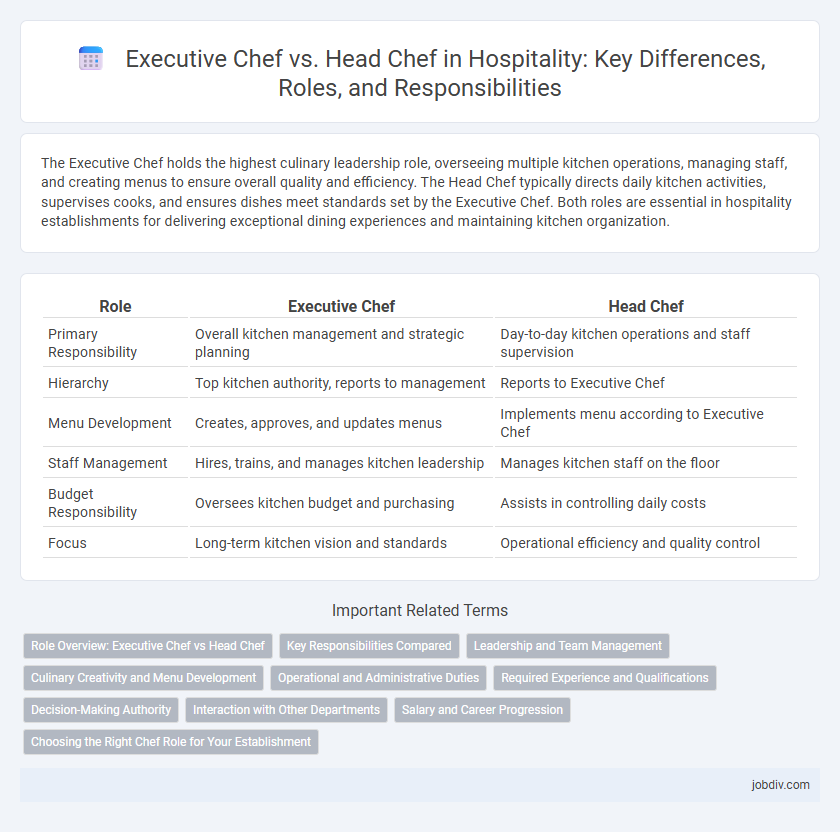The Executive Chef holds the highest culinary leadership role, overseeing multiple kitchen operations, managing staff, and creating menus to ensure overall quality and efficiency. The Head Chef typically directs daily kitchen activities, supervises cooks, and ensures dishes meet standards set by the Executive Chef. Both roles are essential in hospitality establishments for delivering exceptional dining experiences and maintaining kitchen organization.
Table of Comparison
| Role | Executive Chef | Head Chef |
|---|---|---|
| Primary Responsibility | Overall kitchen management and strategic planning | Day-to-day kitchen operations and staff supervision |
| Hierarchy | Top kitchen authority, reports to management | Reports to Executive Chef |
| Menu Development | Creates, approves, and updates menus | Implements menu according to Executive Chef |
| Staff Management | Hires, trains, and manages kitchen leadership | Manages kitchen staff on the floor |
| Budget Responsibility | Oversees kitchen budget and purchasing | Assists in controlling daily costs |
| Focus | Long-term kitchen vision and standards | Operational efficiency and quality control |
Role Overview: Executive Chef vs Head Chef
The Executive Chef oversees the entire kitchen operations, including menu development, budgeting, and staff management, ensuring consistency and quality across multiple outlets or shifts. The Head Chef, also known as Chef de Cuisine, focuses primarily on day-to-day kitchen management, supervising the culinary team and maintaining food preparation standards. Both roles require strong leadership, but the Executive Chef operates at a strategic level while the Head Chef handles tactical kitchen execution.
Key Responsibilities Compared
The Executive Chef oversees menu development, budget management, and staff training to ensure high culinary standards across multiple outlets, while the Head Chef focuses primarily on daily kitchen operations and food preparation within a single restaurant. Executive Chefs coordinate with suppliers, manage inventory, and implement kitchen policies, emphasizing strategic leadership and kitchen efficiency. Head Chefs supervise kitchen staff directly, maintain quality control, and ensure timely service during shifts, prioritizing operational execution and team coordination.
Leadership and Team Management
Executive Chefs oversee kitchen operations with strategic leadership, focusing on menu development, budgeting, and staff training to ensure culinary excellence and profitability. Head Chefs manage day-to-day kitchen activities, directly supervising line cooks, ensuring food quality, and maintaining workflow efficiency. Effective team management under both roles is crucial for fostering collaboration, maintaining high standards, and achieving operational success in hospitality settings.
Culinary Creativity and Menu Development
Executive Chef drives culinary creativity by designing innovative menus that reflect both seasonal trends and guest preferences, elevating the overall dining experience. Head Chef focuses on executing these menu concepts in the kitchen, ensuring consistency, quality control, and efficient team management. Together, they balance visionary culinary development with practical kitchen operations to deliver exceptional dishes.
Operational and Administrative Duties
Executive Chefs oversee overall kitchen operations, focusing on menu development, budgeting, and staff management to ensure high-quality food service and efficient workflow. Head Chefs manage daily kitchen activities, including supervising food preparation, maintaining inventory, and enforcing hygiene standards. Operational responsibilities primarily fall to the Head Chef, while administrative and strategic duties are handled by the Executive Chef.
Required Experience and Qualifications
An Executive Chef typically requires over 7 years of culinary experience, including extensive management and leadership roles, with qualifications such as a culinary arts degree or professional certifications like the Certified Executive Chef (CEC) designation. A Head Chef generally needs 3 to 5 years of hands-on kitchen experience, strong culinary skills, and often formal training from culinary schools or apprenticeship programs. Both roles demand expertise in menu planning, food safety standards, and team management, but the Executive Chef's qualifications emphasize strategic oversight and business acumen in addition to culinary mastery.
Decision-Making Authority
The Executive Chef holds the highest decision-making authority in a hospitality kitchen, overseeing menu creation, kitchen operations, and staff management. The Head Chef, reporting to the Executive Chef, primarily focuses on daily kitchen execution and managing the culinary team on shift. This hierarchical structure ensures streamlined decision-making for operational efficiency and consistent food quality.
Interaction with Other Departments
Executive Chefs coordinate closely with other departments such as purchasing, marketing, and front-of-house to ensure menu consistency, cost control, and guest satisfaction. Head Chefs maintain daily communication with kitchen staff and liaise with service teams to ensure smooth meal preparation and timely service. Both roles require effective collaboration to align culinary output with overall hotel or restaurant operations.
Salary and Career Progression
Executive Chefs typically earn higher salaries than Head Chefs, with average annual earnings ranging from $70,000 to $120,000, depending on the establishment and location. Career progression from Head Chef to Executive Chef involves expanding responsibilities, including menu planning, budget management, and overseeing multiple kitchen teams. Industry data indicates that Executive Chefs often transition into broader hospitality management roles, leveraging their leadership experience for higher executive positions.
Choosing the Right Chef Role for Your Establishment
Selecting the right chef role depends on your establishment's size and operational needs; an Executive Chef oversees multiple kitchens and focuses on menu development, budgeting, and team management, while a Head Chef typically manages day-to-day kitchen operations and staff supervision in a single kitchen. In larger hotels or restaurant groups, the Executive Chef ensures consistency and innovation across venues, whereas smaller restaurants benefit from a Head Chef's hands-on leadership. Understanding these distinctions helps optimize kitchen efficiency, food quality, and overall guest satisfaction.
Executive Chef vs Head Chef Infographic

 jobdiv.com
jobdiv.com